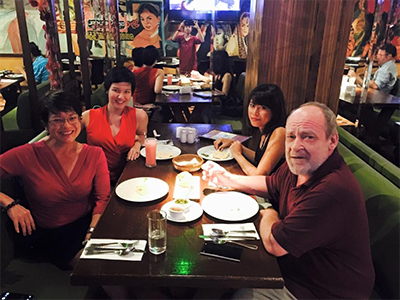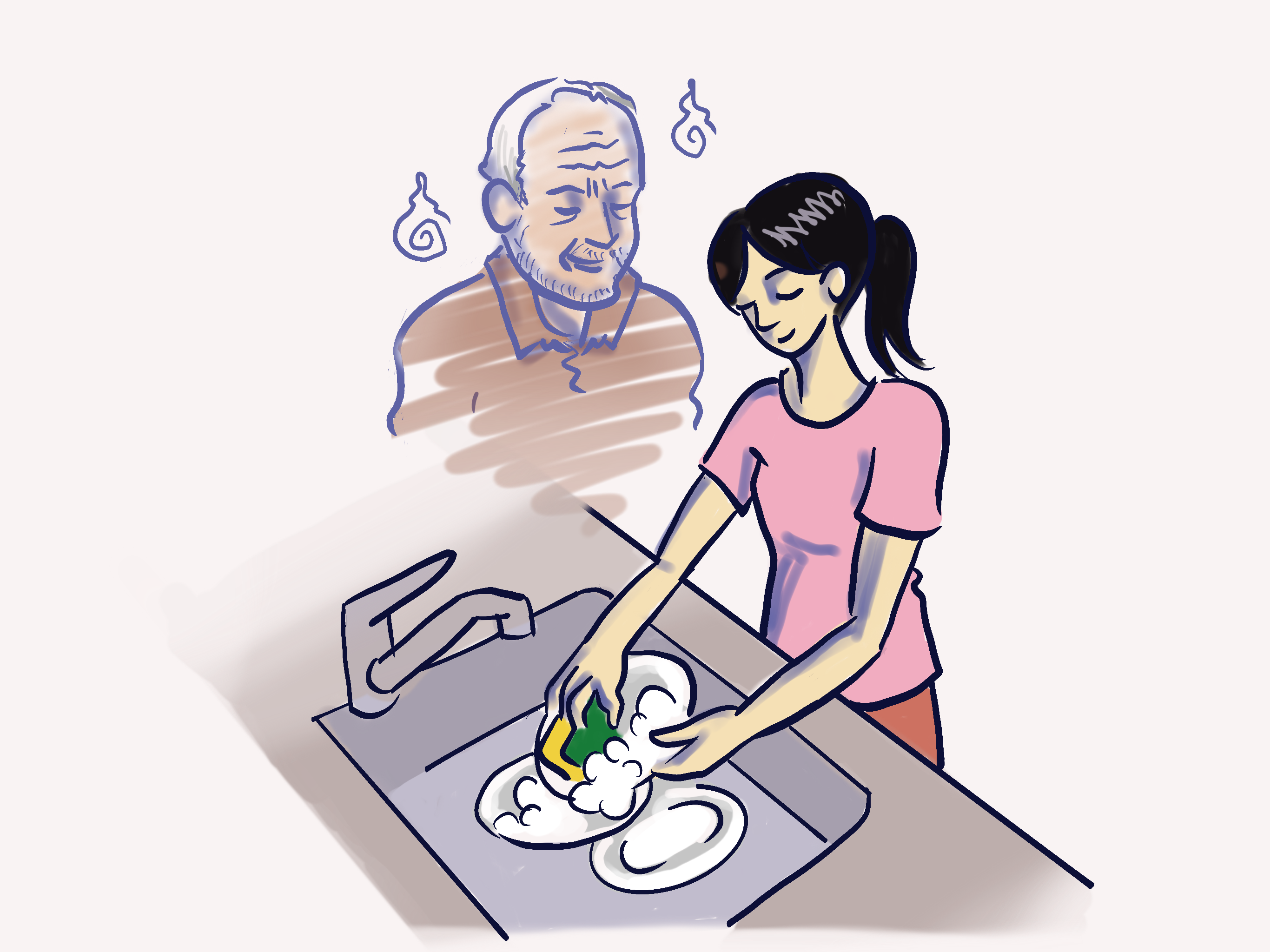
I am grieving.
Let me start by telling you about Uncle David. He had been a good friend of my mother’s, so we met when I was 8 and he was almost 50. He didn’t have any kids, nor did he want any; he didn’t even want me to call him Uncle which is what I’d been taught to do with all of mom’s friends. It was only when I took an interest in his collection of science fiction and fantasy novels that we really started to talk. I was a voracious reader throughout my childhood, and he had this library of books that he’d collected throughout a lifetime of travel across and within various countries. So he had become my librarian, and I guess he’d found someone new to talk to about these books that were hard to find in Manila bookstores.
He’d been a “devout” atheist since well before I met him, and while he never talked to me about it or tried to influence me in any way, I’d always known that about him. Now I, on the other hand, had been a very religious and devout Catholic as a child, probably until early high school. By the age of 11 or so, I’d started reading about other religions, asking questions my religion teachers didn’t like, and finally, I’d started looking into physics. I’d grown interested in it enough that the next time I visited Uncle David, I picked up his copy of A Brief History of Time by Stephen Hawking. At that point, just by understanding the sheer scale of the universe and the math of it all, it seemed clear to me that the existence of a god didn’t make sense and wasn’t even necessary.
I was 13 when I could no longer truthfully call myself a Catholic. With all the logic of the average 13-year-old, I initially decided that I could never tell Uncle David because surely he’d rat me out to my mom, so I found myself on random online forums talking to other people who’d just discovered that they were atheists. Many of them were angry and hateful, and they encouraged me to be angry and hateful at how religion destroyed humanity. Eventually, I told Uncle David about it. He said something to the effect of “Ahh. Is that so? Alright.” And we just proceeded to talk more about novels by Iain Banks and Terry Pratchett.
I’d spent my youth centering my identity around being Catholic, so I naturally tried to do the same once I realized I was an atheist. It was only until Uncle David stepped in that I remembered I could be interested in more topics than just religion and ideations of death. And as I grew up, I found that we had more things to talk about. First just books and video games he played, then politics in different countries, then history, wealth inequality, even what my mom is like as a friend vs how she is as a parent.
He helped me find my first apartment when I realized I wanted to move out, he helped me judge my mom kindly even if she was prickly to both of us at the time, and he even teased me into learning how to cook. He’d spent a large chunk of his career in fintech, so when I started getting into stocks and investments, we would discuss the different companies I should look into and even the different cryptocurrencies he felt comfortable exploring and why. In the pandemic, we’d made promises for future hangouts, I owed him sushi, he owed me steak. We invited each other to our weddings, whenever they would be.
A few years ago, over drinks, we had taken time to talk about our odd parental friendship, and Uncle David told me he was proud of me. He tried to walk it back and say that he didn’t feel like he had the right to be proud of me, having not been my parent. I’m glad I got to tell him that he mattered a lot to me, that he definitely had the right to be proud of me and that it meant a lot to me knowing that he was. I’m so thankful that we had been able to express our care and give reassurance to each other while he was still around; that’s not something everyone gets.
Every step of the way, Uncle David was my first true adult friend, and he was the first person to treat me like an adult in turn. For many topics, he was my only friend who shared the same level of interest as I did, or at least had enough kindness to feign it as best he could.
I found out about his passing less than an hour after having delivered the biggest presentation of my career thus far. I didn’t know what to do, so I tried to check our chat, and found that our last words to each other were about brownie crisps I’d tried to bake for the first time. He gave me tips on how to improve it and said, “Maybe next time”. Well, he won’t be there for next time. Nor will he be there for any new first times.
I’m telling you about Uncle David because I don’t know any other way to explain the magnitude of my loss. He wasn’t a blood relative, or a love interest, I can’t just say “My dad passed away” and have that be the summary of the pain and grief I felt. In some ways, he was like a dad to me and in many other ways, he was definitely not. I haven’t been able to talk about him to anyone who didn’t know him because it would simply take too long to even explain who he was to me. I guess this lack of a cookie cutter explanation lines up pretty well with how atheists generally don’t have a cookie cutter coping mechanism for loss. We don’t have the universal salve of hoping to see them again in *insert preferred afterlife here* to ease the pain.
Now, I’ll tell you about how I grieved. I spent a long time just randomly weeping. I had lost someone who had understood me for a significant part of my life, and many times, he had been the only one to do so. I had lost someone who cared enough to not dismiss me too often and valued my thoughts enough to be willing to discuss. I lost him in the middle of a pandemic that had kept us apart for longer than we’d ever been apart before. We had spent most of the pandemic promising each other “sushimi” dinners that we didn’t realize would never happen.
I’m the type to go to wakes as much as I can because I value extending comfort to those who are grieving and I like to contribute to the people who tell stories and honor the life of the departed; but for Uncley, I could only join his funeral over Zoom. My ability to extend my condolences to the fiancée who survived him was entirely dependent on my internet not giving out. I couldn’t converse with the other people who made it to the chapel. I couldn’t joke with the other atheists there about how ironic it was that we were having it at a chapel at all considering how “devoutly” atheist he was.

When I logged off from the Zoom call, I did not have the solace of imagining that I’ll see him again in the future, because neither of us believe in that. I knew him well enough that I could imagine his reaction to things, and I spent probably too long imagining him as a ghost floating beside me while I washed the dishes, just imagining how another conversation could play out. Often, I wave him away after a while, acknowledging the silliness of talking to myself and crying over my dirty dishes. But Ghost Uncle David still cracks funny jokes and is enthusiastic about stocks and British recipes. I fear the day that a topic will come up and I can’t think up a response for Ghost Uncle David.
I don’t imagine I’ll be able to dwell on Uncle David for very long without crying. Not for the foreseeable future, surely. Most days, I can accept that “Maybe next time” will never happen. As the days have rolled into weeks which have rolled into months, I can rest easy knowing he knew I valued him, and I can feel the comfort of knowing he valued me too.


It’s funny that our lack of belief in a supernatural creator and an all-encompassing plan of salvation can also define what we personally believe. I mean, its one thing to arrive at conclusion that you can’t believe in a deity as others do but does that preclude us creating our own Discworld populated by the us, some of the people we love existing with the mist ridiculous and absurd personalities we can think of or remember? Personally, I’d like to be one of Lord Vetinari’s assistants.
As long as his memory lives on you and what you learned from him is still relevant to your life, he is still alive in your life and no one can gainsay how you create a space in this rational world and the world of your memories – its your call because it’s your choice and because it comforts you to refer to his quips, his humor and your interactions with him. We may not have a heaven to believe in to pin our hopes after we leave our mortal coil but how we comfort ourselves during times of loss and afterwards is no one else’s choice but ours. So grieve in the way that you feel suitable and sufficient – no one has the right to question its depth and breadth. We may not have heaven but “here and now” that we do have, does not limit how we live with the memory of those we’ve loved and lost – his body may be gone but the part of him that imprinted on you remains alive for you to use to direct your life as well as a tool to continue what you can of his legacy.
Measure this event not in terms of what you lost but in what he left you with. With deep condolence for his passing.